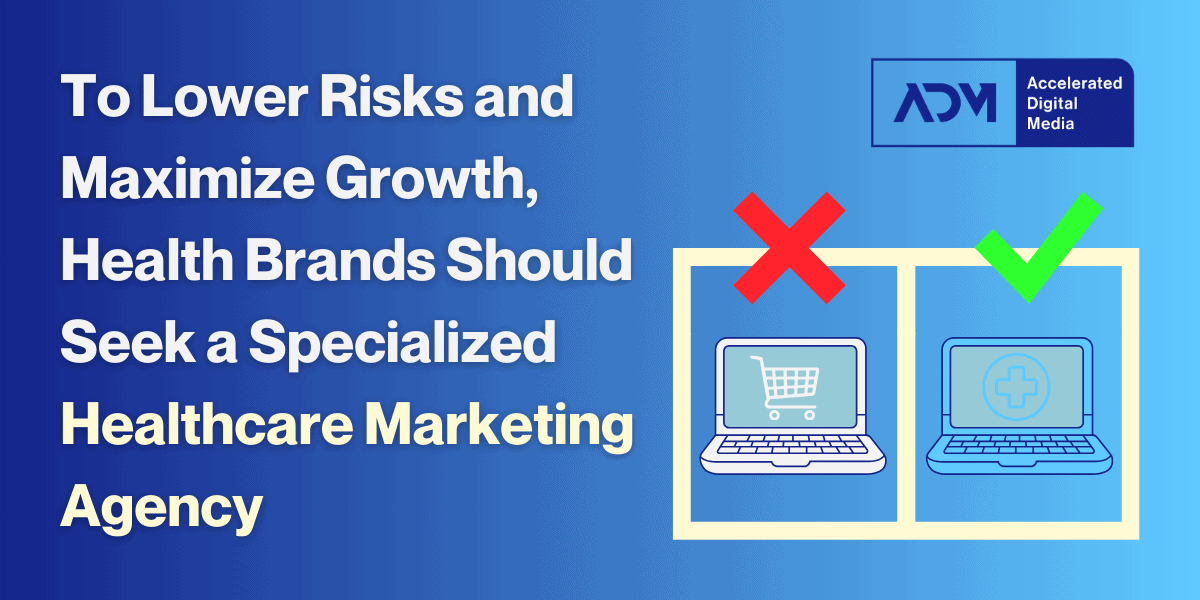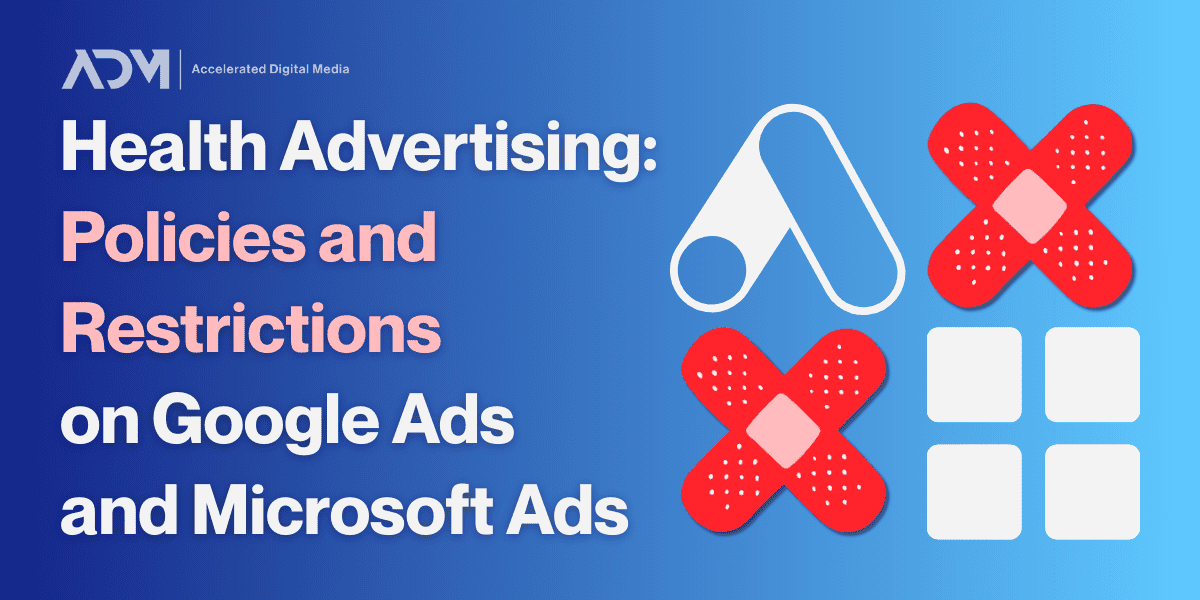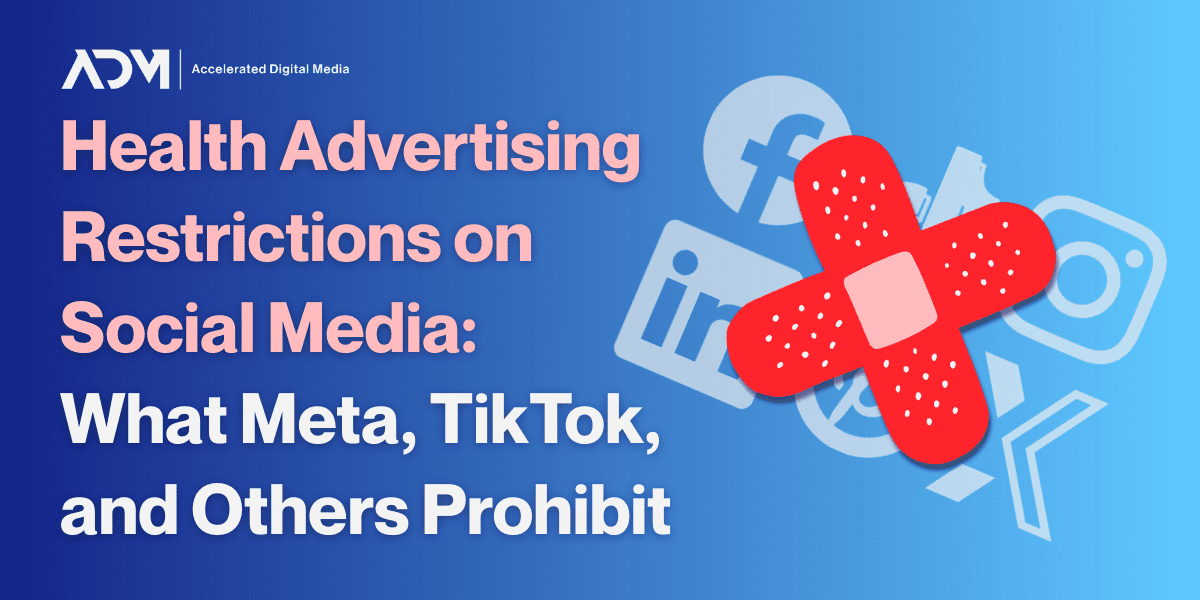Healthcare brands need to compete just like businesses in every other industry—that is to say, they need to deploy tested, effective digital marketing campaigns that educate and invite new patients into the fold. But healthcare is markedly different from every other industry, which makes healthcare marketing a particularly challenging field to compete in.
That leaves health brands in a difficult position when it comes to choosing their marketing partners. There are countless generalist marketing agencies out there who will happily take on any client, and many of them have alluring pitches, great capabilities, impressive client lists, and effective sales tactics. But given the intricacy (and stakes) involved in advertising health products and services, it’s almost always wiser for brands in the industry to partner with a dedicated healthcare marketing agency.
In this blog, we’ll lay out some of the challenges specific to healthcare marketing and explain the advantages of choosing a dedicated healthcare marketing agency rather than a generalist one.
Table of Contents:
- The Many Challenges of Healthcare Marketing
- The Benefits of a Healthcare Marketing Agency
- The Limitations of Generalist Agencies
- What to Consider When Choosing a Health Marketing Agency
- A Proven Partner For Growing Health Brands
The Many Challenges of Healthcare Marketing
There are few industries that present as much complexity as healthcare. That applies to all aspects of the field: It’s difficult to navigate, highly-sensitive, highly-regulated, and involves countless stakeholders. That complexity also holds true for healthcare marketing.
Healthcare Privacy Laws
Health brands are subject to strict privacy laws, most notably the Health Insurance Portability and Accountability Act (HIPAA)—which governs the use and disclosure of personal health information (PHI). HIPAA is a unique challenge for marketers because it was put into law in 1996, well before anyone in Congress could even imagine the full capabilities of digital marketing and the patient privacy perils those could create.
The result has been a slowly-evolving interpretation of the law (and subsequent addendums and agency rules that build on its provisions). In recent years, the Federal Trade Commission (FTC) began to punish companies based on the understanding that sharing PHI with marketing platforms like Google Ads and Meta constituted a HIPAA violation. Because those platforms collect and process so much data, marketing in this field requires a nuanced understanding of what constitutes PHI, what data your website and ads are collecting and sending to marketing platforms, and how to avoid missteps while still taking advantage of effective digital marketing techniques.
Platform-Level Healthcare Marketing Rules
In addition to federal (and some state-level) privacy laws, healthcare marketers also need to be mindful of the patchwork of platform-level policies specific to their industry. Platform-specific policies dictate how they can go about promoting different products like medical devices, health insurance, or telehealth. Many require LegitScript certification for advertising pharmaceuticals, as well.
Each platform—from SEM platforms like Google Ads and Microsoft Ads to social media services like Meta and TikTok—has its own distinct set of rules for health brands. These cover everything from the claims that healthcare brands can make to the subject matter they can display to the specific advertising tools they can use. Meta, for instance, recently introduced new policies preventing healthcare brands from optimizing campaigns around lower-funnel conversion actions out of fears they could generate PHI.
Patient Journeys Don’t Work Like Typical Buying Cycles
If you’re in healthcare, you know that a patient is not a traditional “customer.” The factors people must consider when choosing a health service run much deeper than those they consider when buying a hat. This impacts every aspect of marketing to them—and creates an emphasis early in the “funnel” on educational content. Healthcare marketers must understand how patients learn about conditions and treatments at different stages of the patient journey and align their marketing efforts with those evolving needs.
Healthcare Includes a Wide Variety of Different Company Types and Business Models
The healthcare industry is a niche, but within that niche there’s a lot of diversity. It encompasses numerous company types and business models, each with unique marketing challenges. Insurance companies, medical devices makers, pharmaceutical brands, and healthcare providers are all offering something very different, meaning they need to approach prospective patients in very different ways.
Different sectors of the health industry are even subject to different platform-level restrictions from one another. This means that a healthcare marketing agency can have further specialization, with some focusing solely on clinic networks and hospital systems while others are keen on digital health providers.
The Benefits of a Healthcare Marketing Agency
An expert healthcare marketing agency will be equipped to address the challenges created by this tricky field. It will possess the knowledge and experience to not only set up your marketing strategies for success from the start, but also to tackle problems as they arise.
They Keep Their Compliance Knowledge Up-to-Date
Healthcare marketing agencies will have intimate knowledge of the restrictions that their clients need to navigate. They also are aware of any possible marketing tool or implementation that risks violating those rules. And because those restrictions are always evolving, a specialized agency will stay up-to-date on the latest changes that could have implications for healthcare marketing—even by unintended consequence. Seemingly-unrelated updates can create problems for healthcare marketers if they change how or what data is collected and trasmitted—meaning a good healthcare marketing agency should be examining every new feature and functionality through a PHI-specific lens.
They Have Cultivated Partnerships for Better Health Marketing
Specialized marketing agencies typically aren’t going it alone: They exist in an ecosystem of specialized firms and tools. Healthcare marketing agencies will likely partner with legal experts for HIPAA and other policy analysis. They’ll also forge partnerships with technology providers who help ensure PHI security. At ADM, we work with companies like Freshpaint and Ours Privacy—two of the leading consumer data platforms (CDPs) that focus on securing patient data—so healthcare clients can conduct their digital marketing without sharing data that they shouldn’t.
They Understand Healthcare Audiences
As mentioned prior: patients aren’t consumers. An agency that has been in the healthcare corner for long enough will have a firm understanding of the importance of that distinction. They’ll know how to not only build relevant, compliant healthcare audiences for their health clients, but also how to speak to patient needs through ad copy and creative.
They Have a Playbook for Healthcare Marketing
Any good marketing agency will take its time learning about the nuances of its clients’ businesses and tailoring their marketing strategies to their specific business goals. That process holds true for healthcare marketers—but what they won’t need to do is take a long time learning about the challenges and rules facing healthcare brands. Agencies in this space always need to be nimble, but those who have experience will likely have a solid playbook in place in case they need to shift gears fast. So when marketing campaigns encounter turbulence or new rules change how their clients are allowed to advertise, they will know how to adjust their approaches to keep things running smoothly.
The Limitations of Generalist Agencies
Generalist agencies can be highly-versatile, but the challenges that healthcare marketing present might test the limits of that versatility. Shifting gears from one eCommerce pursuit to another is a fundamentally simpler task than building out an entirely different approach to digital marketing—which healthcare marketing demands.
Healthcare Marketing Strategy Needs to Be Built From the Ground Up
We’ve already discussed most of the challenges that make healthcare digital marketing so unique. There are enough of them that an agency couldn’t simply take a traditional marketing strategy and start changing or subtracting things until they’ve addressed each compliance issue and nuance of marketing to patients: There’d be nothing left.
A thorough healthcare marketing strategy can’t be retrofitted into an existing eCommerce playbook: It needs to be built intentionally and from the ground up. With limitations on how brands can use different marketing platforms, it often results in channels being deployed differently in the health space than they are in other fields.
Take non-brand paid search campaigns, for example: In an eCommerce application, these might be lower-funnel campaigns that include a Shopping Ads element for quick purchases. But in healthcare marketing, these campaigns will need to be deployed at the top of the funnel too to get educational pages in front of prospective patients. Generalist agencies may offer basic direction, but for effective healthcare marketing, specialized expertise is crucial.
It Isn’t Worth Being an Agency’s “Guinea Pig” Client
There’s nothing to say that a generalist agency can’t learn, over time, how to build effective and compliant healthcare marketing strategies. But that is a long, involved process that relies on meticulous research and even trial and error. If your health brand is looking to partner with a digital marketing agency, it’s wise to avoid being any firm’s first entry into the field—because you’re likely to encounter those errors. While occasional slowdowns in marketing performance are an unfortunate reality, breakdowns in compliance have serious consequences that savvy healthcare brands should try to avoid at all costs. There is no replacement for experience.
What to Consider When Choosing a Health Marketing Agency
Healthcare brands have a lot to consider when deciding which marketing agency to entrust with their marketing budgets and growth strategy. In ADM’s view, there are four main places they should focus that search.
Past Experience Across a Variety of Healthcare Businesses
You want a healthcare marketing agency that’s highly-experienced in the field. How long has this firm been focused on the industry? Do their clients see success and stay with them a long time?
But you may also want to make sure that its experience applies to your particular corner of the healthcare industry. For a hospital system, an agency that specializes in digital health will be a better option than a generalist agency, because it will at least know the rules, regulations, and principles of the field. But they’d likely find an even better fit with an agency that specialized in hospital advertising—or had a diverse range of healthcare marketing clients that included hospitals. To vet their experience, ask them about their current client portfolio and request relevant case studies to see if you find alignment.
Range of Healthcare Marketing Services Offered
Which healthcare marketing agency you choose to partner with will often come down to the services they offer. Are you looking to have one agency for all of your digital marketing, or are you planning to spread services between new and existing providers? Find out about the depth of a prospective agency’s offerings across SEM, paid social media, programmatic marketing, and other mediums (email, SEO, etc). Again, requesting case studies and even channel strategy suggestions will help you along your search.
Agency Culture and Flexibility
Some marketing agencies operate more like a piece of software than a living partner—they have a set series of practices that they instill across all client accounts and offer extensive pushback when asked to customize any approach. For the best results, you want to find an agency that tailors everything it does around your specific goals and keeps an open line of communication in case any changes are needed.
Awards and Testimonials
As always, it helps to check the reviews. Has the agency been recognized for its work in healthcare marketing? Do its clients have a lot of positive—and specific—things to say about it? It’s one thing to see a bunch of quotes saying that the agency is great, but it’s helpful to learn what particular aspects of their work have brought them accolades and kind words.
A Proven Partner For Growing Health Brands

How ADM’s Paid Search Strategy Drove an Increase in Cash and Insurance Buyer Conversions
ADM’s paid search approaches drove a 46% increase in cash-payment conversions for this leading women’s health brand.
How ADM’s Paid Search Strategy Drove an Increase in Cash and Insurance Buyer Conversions
We’re not entirely here to toot our own horn, but we’d love to throw our hat in the ring. ADM has been working closely with healthcare clients since our inception, and we’ve helped some of the fastest-growing companies in the industry—from telehealth brands to clinic systems to online pharmacies. We understand the challenges and the stakes of advertising in this sensitive, vital industry, and we pride ourselves on staying informed and ahead of the curve on changing policies and marketing trends.
If you’re seeking a proven healthcare marketing agency that prioritizes growth and true partnership, consider reaching out to our team below:




